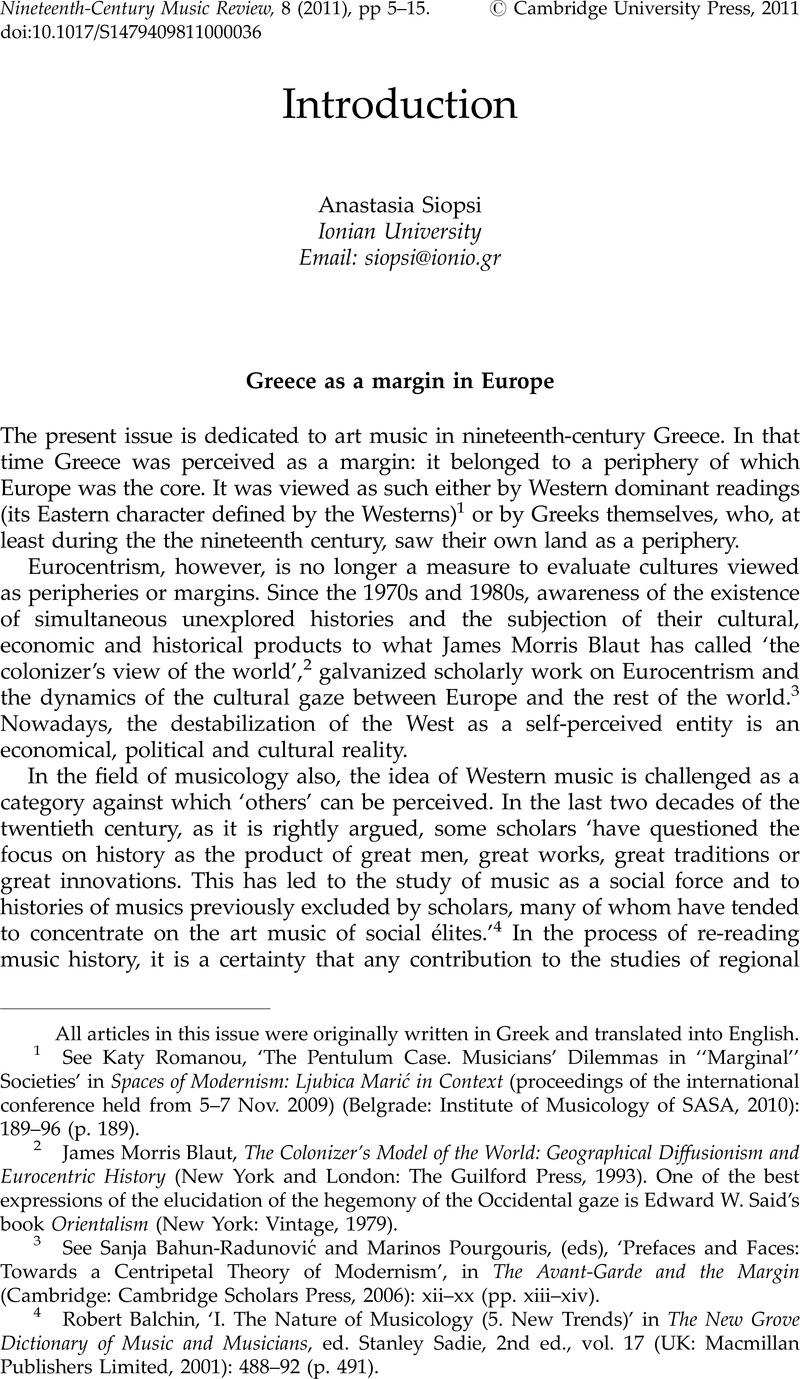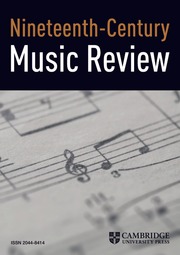No CrossRef data available.
Article contents
Introduction
Published online by Cambridge University Press: 27 June 2011
Abstract

- Type
- Introduction
- Information
- Nineteenth-Century Music Review , Volume 8 , Issue 1: Music in Nineteenth-Century Greece , 27 June 2011 , pp. 5 - 15
- Copyright
- Copyright © Cambridge University Press 2011
References
All articles in this issue were originally written in Greek and translated into English.
1 See Romanou, Katy, ‘The Pentulum Case. Musicians’ Dilemmas in “Marginal” Societies’ in Spaces of Modernism: Ljubica Marić in Context (proceedings of the international conference held from 5–7 Nov. 2009) (Belgrade: Institute of Musicology of SASA, 2010): 189–196Google Scholar (p. 189).
2 Morris Blaut, James, The Colonizer's Model of the World: Geographical Diffusionism and Eurocentric History (New York and London: The Guilford Press, 1993)Google Scholar. One of the best expressions of the elucidation of the hegemony of the Occidental gaze is Said's, Edward W. book Orientalism (New York: Vintage, 1979)Google Scholar.
3 See Bahun-Radunović, Sanja and Pourgouris, Marinos, (eds), ‘Prefaces and Faces: Towards a Centripetal Theory of Modernism’, in The Avant-Garde and the Margin (Cambridge: Cambridge Scholars Press, 2006): xii–xxGoogle Scholar (pp. xiii–xiv).
4 Balchin, Robert, ‘I. The Nature of Musicology (5. New Trends)’ in The New Grove Dictionary of Music and Musicians, ed. Stanley Sadie, 2nd ed., vol. 17 (UK: Macmillan Publishers Limited, 2001): 488–492Google Scholar (p. 491).
5 For the issue of modernism, for example, see some interesting thoughts in Bahun-Radunović and Pourgouris, (eds), ‘Prefaces and Faces’, xii–xx (p. xiii).
6 Conference entitled ‘Rethinking Musical Modernism’, Serbian Academy of Sciences and Arts, 11–13 Oct. 2007. In this conference many new interpretations and views were introduced on the notion of ‘musical modernism’. ( Despić, Dejan, Milin, Melita, (eds), Rethinking Musical Modernism (proceedings of the international conference) (Belgrade: Institute of Musicology, 2008Google Scholar).
7 Conference entitled ‘Beyond the Centres: Musical Avant Gardes since 1950’. In memoriam Yannis Andreou Papaioannou (1910–1989), Thessaloniki, Greece, 1–5 Jul. 2010. In this conference a main theme was ‘beyond’ the ‘mainstream’ historiography of avant garde music, as inferred from the first part of its title (‘Beyond the Centres’). (To gather together research on widely unknown musical realizations of the notion of the avant garde since 1950, and encourage the examination of multiple, heterogeneous currents built around the ideas of innovation and/or radicalism; to stimulate theoretical critical discussion on how the notion of the avant garde can be assessed today ‘from outside’ (beyond the centric generic ideas of the time of its formation) and embrace problematization of the very premise of a unified term for the avant garde).
8 Conference entitled ‘Crossroads: Greece as an Intercultural Pole of Musical Thought and Creativity’, Thessaloniki, Greece, 6–10 Jun. 2011. According to the call for papers, the purpose of the International Musicological Conference is to bring together Greek and foreign musicologists and ethnomusicologists, researchers and students of ancient Greek music, music iconography and Byzantine music, as well as Greek and Balkan music in modern times. All theoretical and methodological means could be included, documenting cross-cultural interactions of the Mediterranean and Balkan people and/or examining the role of ancient Greek civilization in the conceptualization and creation of European music tradition.
The twofold approach of the conference pertains to both the importance of musical interactions among the countries surrounding the Mediterranean Sea and the Balkans, and the imprint of ancient Greek music in Western European musical tradition.
9 Samson, Jim, ‘Nations and Nationalism’ in The Cambridge History of Nineteenth-Century Music (Cambridge: Cambridge University Press, 2002), 568–600Google Scholar (p. 594); see also Richard Taruskin's view on Russian music, suggesting that European musicians constructed their own Russia and that the Europeans’ evaluation of this music does not coincide with that of Russian musicians. ( Taruskin, Richard, ‘Some Thoughts on the History and Historiography of Russian Music’, Journal of Musicology 3/4 (1984): 321–339Google Scholar).
10 It is important to mention that research in the field of Greek art music is progressing, especially during the last two decades, mainly by means of the various and frequent academic events, publications, and other activities organized by the four Music Departments established so far in the Greek University. One of the most important foundations that supports research on nineteenth-century Greek art music is the Hellenic Music Research Lab (HMRL) of the Ionian University which was founded in 2000. HMRL has initiated activities in archival research, concentrating on bibliography and recordings, publications, recordings, concerts, organization of conferences and colloquia etc.
HMRL activities in the field of nineteenth-century Greek art music include:
- i)
i) The critical edition of Nikolaos Halikiopoulos Mantzaros’ 1815 concert arias in the series Monuments of Neohellenic Music (2006).
- ii)
ii) The collected volume Nikolaos Halikiopoulos Mantzaros: A Contribution for the 130 Years from the Composer's Death (2003).
- iii)
iii) The autobiography of the Greek opera composer Pavlos Karrer, ed. Giorgos Leotsakos (2003).
- iv)
iv) Multiple contributions (twelve CDs and books in Greek and English) in Works by Greek Composers of 19th and 20th Century (Cultural Olympiad, 2004).
- v)
v) The organization of several conferences and colloquia on music in nineteenth-century Greece (including music education, musical theatre, ideology etc.).
- vi)
vi) The completion of several doctoral theses on Greek nineteenth-century music.
- vii)
vii) Articles and research on Greek nineteenth-century music published in the HMRL bulletin Moussikos Ellenomnemon. Topics cover areas such as opera, symphonic music, composer and performer biographies, music education, music journalism, musical terminology, ‘Western’ views of ‘Greek’, romantic ideologies and the Greek world etc.
11 Xanthoudakis, Haris, ‘Composers, Trends and the Question of Nationality in Nineteenth-Century Musical Greece’, Nineteenth-Century Music Review 8/1 (Jun. 2011): 41–55CrossRefGoogle Scholar.
12 In more detail, the first independent Greek state was established in 1830 and occupied only a small part of present-day Greek territory, the less economically developed Peloponnese, Central Greece, Cyclades and Sporades Islands. The concept of the ‘Great Idea’, the aim of which was to free all Greeks still under the Ottoman yoke, was the main pillar of Greece's foreign policy at the time. The first governor of the country was Ioannis Capodistria, whose reform policies created enemies. Capodistria was assassinated in 1831. Amid the ensuing anarchy, the Great Powers intervened and by the Treaty of London (1832) imposed a hereditary king, Otto, son of the King of Bavaria. However in 1843, Otto gave in to popular pressure and conceded to a conservative Constitution, which regrettably was often ignored. As a result, Otto was finally forced to abdicate and leave the country in 1862. The new Constitution of 1864 established a Constitutional Monarchy, according to which the king continued to be the head of state, although there was provision for the introduction of a single-Chamber parliament to be elected by universal male suffrage. Meanwhile, a new king was enthroned, George I of the Danish House of Glücksburg, and the Ionian Islands were united with Greece, followed by the annexation of Thessaly and part of Epirus a few years later (1881) (see http://www.eu2003.gr/en/cat/120).
13 Leotsakos, George, ‘Greece, III, 1: Art Music since 1770’ in The New Grove Dictionary of Music and Musicians, ed. Stanley Sadie, 2nd ed., vol. 10 (UK: Macmillan Publishers Limited, 2001), 349–351Google Scholar (p. 349).
14 The term ‘Greek Enlightenment’ means the secularization of ideas and education, apparently influenced by the spiritual achievements of the eighteenth-century West.
15 Romanou ‘The Pentulum Case’, 190.
16 See Synadinos, T.N., Historia tis Neohhelenikis musikis. 1824–1919 (Athens: Typos, 1919): 106–107Google Scholar.
17 See Kourbana, Stella, ‘The Birth of Music Criticism in Greece: The Case of the Historian Konstantinos Paparrigopoulos’, Nineteenth-Century Music Review 8/1 (Jun. 2011): 85–100CrossRefGoogle Scholar.
18 Leotsakos, ‘Greece, III, 1’, 350.
19 Ibid.
20 See, for more detail, Romanou, Katy and Barbaki, Maria, ‘Music Education in Nineteenth-Century Greece; Its Institutions and their Contribution to Urban Musical Life’, Nineteenth-Century Music Review 8/1 (Jun. 2011): 57–84CrossRefGoogle Scholar.
21 Leotsakos, Georgios, ‘Introductory Notes’ in Luchnos ipo ton Modion [Light under a Bushel]: Erga Ellinon Sintheton gia Piano, 1847–1908 [Piano Works by Greek Composers, 1847–1908], (Crete: Crete University Press, 1999): 8–30Google Scholar (p. 11).
22 For example, the periodical Apollon issued by the ‘Lottner Conservatory’ (founded in Sep. 1899) from 1903 presented works of the German Classical composers, making their works known to a musical public.
23 For the links between German Romanticism and Greek art music at the end of the nineteenth century, see Anastasia Siopsi, ‘Music in the Imaginary Worlds of the Greek Nation: Greek Art Music during the Nineteenth-Century's fin de siécle (1880s–1910s)’, Nineteenth-Century Music Review 8/1 (Jun. 2011): 17–39.
24 See Romanou and Barbaki, ‘Music Education’, 77–84.
25 Of course, that was not only a Greek phenomenon; as Jim Samson observes, referring to the period following 1848 in Europe, there was a ‘rise of a Romantic aesthetic, German in origin and nature … profoundly threatening to the prestige of Italian opera, inimical to its entertainment status, to its approach to text and authorship, and even to its performance conditions. The result was a loss of confidence (by Italians themselves) in the primacy of Italian music, as German symphonism increasingly dominated European musical culture as a whole.’ (Samson, ‘Nations and Nationalism’, 583; see also Rosselli, John, ‘Italy: The Decline of a Tradition’ in Jim Samson (ed.), The Late Romantic Era: From The Mid-19th Century to World War I (Palgrave Macmillan, 1992): 130–131Google Scholar).
26 Seferis, George, On the Greek Style (Athens, 1938): 94Google Scholar.
27 Beard, David and Gloag, Kenneth, ‘Nationalism’ in Musicology: The Key Concepts (London: Routledge, 2005): 117–122Google Scholar (p. 118).
28 It should be mentioned that, according to Xanthoudakis, the new state's earliest composer was the Chiot scholar Konstantinos Nikolopoulos (1786–1841). (Xanthoudakis, ‘Composers’, 41).
29 Leotsakos, ‘Introductory Notes’, 9. Leotsakos connects this year with Iossif Liveralis's composition The Awakening of the Klepht (1847).
30 ‘Herder … identified the nation with its cultural heritage and its language, and in doing so he strengthened the notion that there exists a Volksgeist, a genuine “spirit of the people” that acts as a kind of national glue.’ (Samson, ‘Nations and Nationalism’, 571).
31 Ibid., 587.
32 See Kardamis, Kostas, ‘From Popular to Esoteric: Nikolaos Mantzaros and the Development of his Career as Composer’, Nineteenth-Century Music Review 8/1 (Jun. 2011): 101–126CrossRefGoogle Scholar.
33 See, in more detail, Leotsakos, ‘Introductory Notes’, 23–4; see, also, Leotsakos ‘Liveraris or Liberalis Iossif' in Luchnos ipo ton Modion, 33–6 (pp. 34–5).
34 For the belief in the incompatibility of the musical systems of the ‘Oriental’ and the ‘Occidental’ see Hermoupolis, 120 (31 Dec. 1866), 122 (12 Jan. 1867), 125 (2 Feb. 1867); quoted in Xanthoudakis, ‘Composers’ footnote 20.
35 For more detail on folklorism and Ionian composers, see Xanthoudakis, ‘Composers’.
36 Almost xenophobic, and became even more so in the interwar era.
37 I am referring to the disastrous Greco-Turkish War of 1897, the two Balkan Wars (the first in 1912–13 against the Ottoman Empire, the second in 1913 against Bulgaria) and, finally, Greece's defeat in Asia Minor of 1922.
38 For more detail on musical nationalism in Greece at the end of the nineteenth century, see Anastasia Siopsi, ‘Music in the Imaginary Worlds of the Greek Nation: Greek Art Music during the Nineteenth-Century's fin de siécle (1880s–1900s)’, Nineteenth-Century Music Review 8/1 (Jun. 2011): 17–39.




